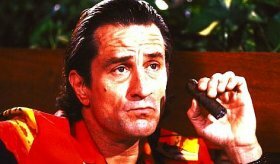|
|
| Tookey's Review |
|
| Pro Reviews |
|
| Mixed Reviews |
|
| Anti Reviews |
|
| Cast |
|
| |
 |
| |
| Released: |
1991 |
| |
|
| Genre: |
UNDERRATED
REMAKE
HORROR
THRILLER
|
| |
|
| Origin: |
US |
| |
|
| Colour: |
C |
| |
|
| Length: |
123 |
|
| |
|
| |
|
|
| |
|
|
A lawyer (Nick Nolte) and his family are threatened by a madman (Robert de Niro).
|
Reviewed by Chris Tookey
|
|
One of the most controversial films of the Nineties. Technically - as even Scorsese’s most scathing critics admitted - his direction, Thelma Schoonmaker's editing and Freddie Francis's cinematography are spectacular. The film is an even more stunning succession of images and visual pyrotechnics than GoodFellas. Scorsese is a director who can turn a teddy-bear into a symbol of evil, and an ordinary staircase into a vision of Dante's Inferno.
There's an unforgettable shot, for example, of the villain (Robert De Niro) seducing the hero's daughter (Juliette Lewis) over her pink little bedroom phone: De Niro's silky, reasonable voice contrasts with the camera's serpentine slide past his hard, black, fetishistic body-building equipment to reveal the man himself. Only then do we find he's hanging upside down, like a tattooed, muscular bat. And the camera itself turns through 180 degrees, to show De Niro's unearthly grin, with gravity standing his hair on end, as if he's a demon from Struwwelpeter. Scorsese transforms a small, functional scene into a masterpiece of menace.
But the best thrillers are more than well-crafted: they bring us face to face with our deepest fears. De Niro's bogeyman, Max Cady, is a wonderfully complex nightmare figure, the unconscious wish-fulfilment of every main character. To his rape victim (Illeana Douglas), he's a piece of rough whom she picks up in a bar, to express her independence from the lover who's stood her up (Nick Nolte). She's turned on by Cady's boast that "I'm just one hell of an animal"; she even giggles in bed when he handcuffs her. Cady is an embodiment of her sexual fantasies, taken just that one horrible step further into nightmare.
Cady appeals to the hero's 15 year-old daughter by voicing her adolescent sense of injustice. He echoes the marital resentments of his wife (Jessica Lange), with whom Cady shares a sense of betrayal and a history of mental illness. To our lawyer hero (Nick Nolte), Cady represents his own guilty conscience - Cady has a perfectly reasonable legal grievance against him. Cady is also an unpleasant reminder to our hero of his own violent side. From the start, Nolte is a mass of sublimated aggression: his squash defeat of his mistress is as violent in its way as Cady's rape of her, only a few scenes later. Nolte hires men to beat up Cady and - another hint of suppressed sadism - goes to watch. Under stress, Nolte even comes close to striking his wife and daughter.
In the first Cape Fear, Gregory Peck played the hero as a pillar of family rectitude: Nolte is an altogether more flawed, Scorsesian and believable character.
Here, as in Taxi Driver, Scorsese is fascinated by the violence which exists below the surface of respectable society. The first attack we see in the picture is performed not by the psychopathic villain, but by Nolte on Cady - and the setting is highly significant. The 4th July parade featuring soldiers carrying an American flag, is a reminder that America is a society founded not only on legal rights, but also on the threat of institutionalised violence.
This most Hobbesian of films also exploits our unconscious fears about the rule of law. Nolte's original betrayal of Cady, by not revealing the sexual past of his last rape victim, reflects our hero's belief that the law doesn't protect a promiscuous woman who has been raped. Nolte's girl-friend, the rape victim, knows for the same reason that the law won't protect her and refuses to press charges.
And it's a film which strikes to the heart of middle-class anxieties about materialism. Cady expresses Nolte's unconscious fear that he has lost his sense of values. "I'm gonna teach you the meaning of commitment," Cady tells him, in a friendly moment. "You could say I'm here to save you". Nolte and his family pass through a Hell where they are tested by fire and water, and end up baptized and "born again". It's a story of guilt and redemption. Scorsese once studied to become a Catholic priest, and his religious theme places Cape Fear in the mainstream of his work.
The acting throughout is of a high standard. Juliette Lewis is sensational in her one-take scene with De Niro in an empty theatre, and Robert De Niro makes seamless transitions from sly comedy to the grandest of grand guignol. It's not hard to see why De Niro likes appearing in Scorsese movies (Cape Fear was his seventh). He is wonderfully served by the visuals: one of the most terrifying shots is almost before he's had to start acting. Cady leaves jail with storm clouds and lightning flickering overhead, walks expressionlessly towards camera and never stops coming until his face is distorted by the anamorophic lens. You can actually feel the audience flinch and pull back.
The serious aspects of the film are, to some extent, victims of its success as a thriller: you can enjoy Cape Fear merely as the Rolls Royce of slasher movies, a two-hour anxiety attack, without bothering to look far into its murky depths. But that is only to say that it repays being seen more than once. Okay, ity is a genre film - but Cape Fear is one of the most misjudged films in recent history.
|
|
|
|
|
